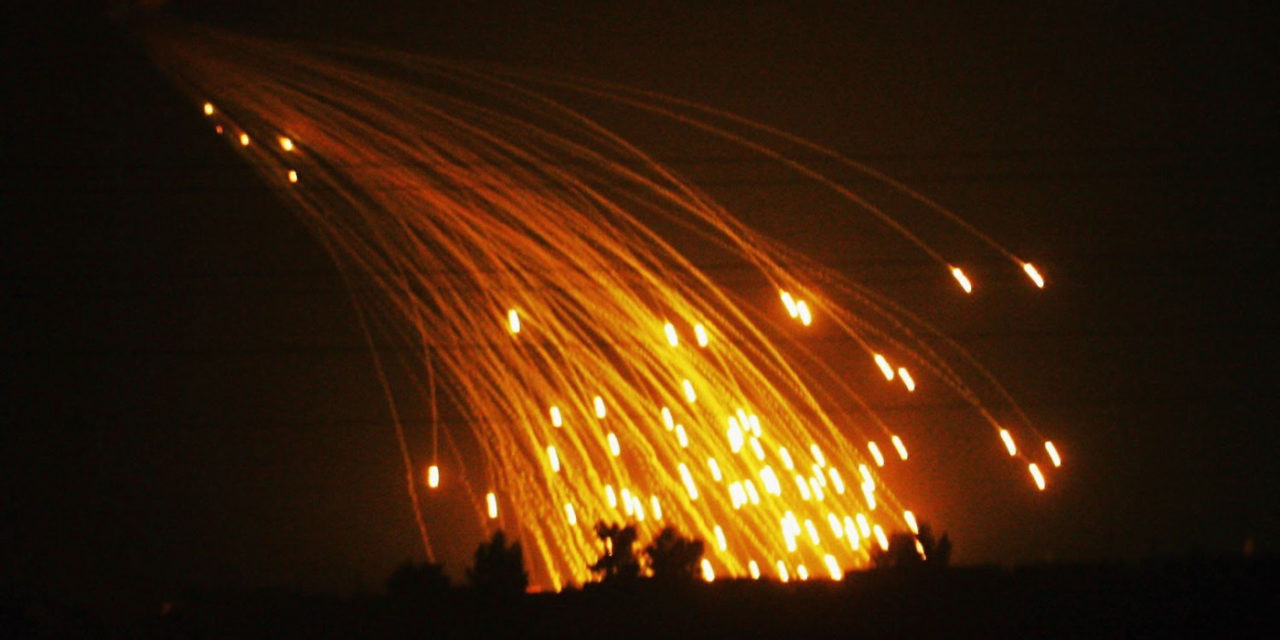PHOTO: Image from claimed Russian incendiary attack on northern Homs Province early Saturday
Writing for The Arab Weekly, Mamoon Alabbasi considers the US-Russian ceasefire for Syria and whether it can be sustained, with analysis from and EA’s Scott Lucas and Chris Doyle of the Council for Arab-British Understanding:
Experts are not certain at this stage whether the US-Russian brokered ceasefire in Syria can hold for a long period of time or if it can pave the way for a potential settlement between the warring parties.
The ceasefire…excludes the Islamic State and Jabhat Fateh al-Sham, formerly known as al-Nusra Front.
If the ceasefire holds and aid is delivered to besieged areas, Washington and Moscow plan to coordinate air strikes against ISIS and Jabhat Fateh al-Sham.
UN Special Envoy Staffan de Mistura was, however, expressing frustration with the Syrian government for not doing its part in allowing the access of aid to Aleppo. Another hurdle would be the separation of moderate rebel groups from the hard-line Jabhat Fateh al- Sham, which Washington and Moscow consider a terrorist group.
Russian Deputy Foreign Minister Mikhail Bogdanov told the BBC that Russia would target areas where Jabhat Fateh al-Sham fighters are located, even if moderate opposition forces are with them. He added that this has been agreed to by the United States.
Details of the Russian-US agreement are unknown. France has called for them to be made public.
The ceasefire allowed Syrians to enjoy a much-needed period free of violence. The most recent cessation of hostilities was in February, also brokered by the United States and Russia, and ended with government and opposition forces trading blame for violations.
Expectations for a permanent settlement for the conflict in Syria are not much higher this time. Despite the high toll of the conflict — estimated at more than 400,000 killed — the main belligerents and their backers do not seem to be too exhausted to continue the war.
“For the ceasefire to have any chance to succeed it must be built upon additional local deals from the bottom up as well as top down,” said Chris Doyle, director of the London-based Council for Arab-British Understanding (CABU).
“The monitoring mechanism needs to be robust and considerably larger and more effective than in 2012,” said Doyle, adding that “other confidence-building measures must include a sizeable release of detainees”.
“This all ultimately must lead to a viable political process that delivers real change in Syria, including the end of conflict,” said Doyle, who added that he was sceptical that such measures were going to be adopted on the ground.
“Only Kerry Genuinely Thinks There Can Be A Solution”
His doubts were shared by Scott Lucas, Professor of International Politics at the University of Birmingham, England.
“Every party to the conflict in Syria is looking to use the ceasefire for improving its military position,” said Lucas, who is also the editor of EAworldview.com website, which focuses on Syria.
“The only exception is US Secretary of State John Kerry, who is genuinely looking for a political solution to come out of it,” Lucas said, adding that the Pentagon was not convinced by the ceasefire deal.
Each side is trying to secure what it holds.
“Russia delayed agreeing on such a deal with the US until it made sure that the regime’s siege of Aleppo was firm and, ahead of the ceasefire, the regime intensified its air strikes against rebel-held areas in Idlib,” noted Lucas.
Opposition forces also needed a break from regime bombardment to consolidate control in areas they hold and Lebanon’s Hezbollah militants needed a period to breathe, argued Lucas.
Kurdish militants of the People’s Protection Units (YPG), who have agreed to observe the ceasefire, welcomed the lull following the Turkish bombardment of their positions. At the same time, the Turks, continued Lucas, will use the opportunity to consolidate the presence of the rebels they back in the area.
“Although no side is keen on maintaining the ceasefire, no one wants to fire the first shot and be blamed for the ceasefire’s collapse,” he said.
No One in Winning Position
Despite the general lack of will to find a political settlement, no party is capable of winning the war or expanding its territory significantly.
“Even with the help of Iran, Hezbollah, Iraqi and Afghan Shia militias, the Syrian regime does not have enough manpower to expand,” Lucas said. “The rebels, on the other hand, have the manpower but they lack sufficient military capabilities to take on the regime.”
The regime, backed by the Russians, has dominated the Syrian skies with its air power, the bulk of which targeted rebel-held areas.
The US-led coalition focused its airstrikes on ISIS-held areas. Turkey’s recent airstrikes sought to push back ISIS and YPG presence along Syrian-Turkish border areas. Both the United States and Turkey have avoided bombing regime positions.
A joint US-Russian bombardment of Jabhat Fateh al-Sham positions could tilt the balance of power in the regime’s favor in northern Syria. The side that would fill the vacuum in ISIS-held areas once the militants are forced to evacuate them would also benefit from the US-Russian deal.

